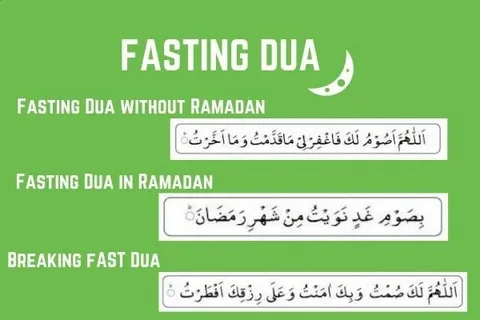Last Updated on March 12, 2024 by Arabian Tongue Team
Dua, or supplication, holds a significant place in Islam. It is a means through which Muslims communicate with Allah, seeking guidance, blessings, and forgiveness. While Ramadan is known for its heightened spiritual significance and emphasis on dua, the practice of making dua extends beyond this blessed month. Fasting outside Ramadan also offers opportunities for believers to engage in dua, seeking spiritual growth, and divine intervention, in this article on Arabian Tongue we will explorer dua for fasting outside ramadan.
Understanding the Significance of Dua

In Islam, dua is considered an act of worship and a manifestation of one’s dependence on Allah. It is a fundamental aspect of faith, reflecting a believer’s recognition of Allah’s sovereignty and mercy. Through dua, individuals express their needs, desires, and gratitude to Allah, acknowledging His limitless power and wisdom.
The Concept of Fasting Outside Ramadan
While fasting during Ramadan is obligatory for all adult Muslims, voluntary fasting holds its own merit in Islam. dua for Fasting outside of Ramadan, whether it be on Mondays and Thursdays, the White Days, or other occasions, is highly encouraged. These voluntary fasts offer spiritual benefits and opportunities for personal growth.
Many people fast for health reasons, such as intermittent fasting, which involves cycling between periods of eating and fasting. This practice is believed to have various health benefits, including weight loss, improved metabolic health, and increased longevity.
Fasting is also sometimes used as a detoxification or cleansing method, although its efficacy for this purpose is debated among health professionals.
Types of Dua for Fasting Outside Ramadan
There are various types of dua that one can make while fasting outside Ramadan. These include dua for seeking strength and patience to endure the fast, dua for seeking forgiveness for past sins, and dua for spiritual growth and closeness to Allah.
- Dua for Acceptance of Fasting: This dua is recited to seek Allah’s acceptance of the fast and the sincerity of one’s intentions.
- Dua for Forgiveness: Muslims seek forgiveness for their sins through fasting and may recite duas asking for Allah’s mercy and forgiveness.
- Dua for Strength and Patience: Fasting can be physically and mentally challenging, so Muslims often recite duas asking for strength, patience, and perseverance to complete their fasts successfully.
- Dua for Spiritual Growth: Muslims may recite duas asking for spiritual growth, increased faith, and a deeper connection with Allah during their fasting period.
- Dua for Protection from Evil: Seeking protection from negative influences, temptations, and evil deeds is another common theme in dua during fasting.
- Dua for Blessings and Gratitude: Muslims may express gratitude to Allah for the blessings they have received and ask for further blessings for themselves, their families, and the wider community.
How to Make Dua for Fasting Outside Ramadan
Making effective dua involves sincerity, humility, and faith. It is essential to make dua with a pure heart, focusing on one’s intentions and trusting in Allah’s mercy. Choosing the right words, following the etiquette of dua, and observing the recommended times for supplication are crucial aspects of making dua for fasting outside Ramadan.
Examples of Dua for Fasting Outside Ramadan

Certainly! Here are some examples of dua (supplications) that Muslims may recite during fasting outside Ramadan:
- Dua for Beginning the Fast:
- “Allahumma inni nawaytu sawma ghadin min shahri [or: min ayami] Ramadan. Fataqabbal minni innaka anta as-Sami’ul-‘Alim.” Translation: “O Allah, I intend to fast tomorrow [or: today] in the month of Ramadan. Accept it from me, surely You are the All-Hearing, the All-Knowing.”
- Dua for Breaking the Fast:
- “Allahumma inni laka sumtu wa bika aamantu wa ‘alayka tawakkaltu wa ‘ala rizq-ika aftartu.” Translation: “O Allah, I fasted for You, and I believe in You, and I put my trust in You, and with Your sustenance, I break my fast.”
- Dua for Forgiveness:
- “Allahumma inni as’aluka min rahmatika allati wasi’at kulli shay’in, wa min ‘afwika wa ghufurika, wa min husni ‘ibadatika, wa min ridaka, wa min jannatika, wa min naarak.” Translation: “O Allah, I ask You for Your mercy which encompasses everything, and Your forgiveness, and Your pleasure, and the best of worship, and Your satisfaction, and the Paradise, and protection from the Fire.”
- Dua for Strength and Patience:
- “Allahumma inni as’aluka fi’lal khayrat wa tarkal munkarat, wa hubbal masakin, wa an taghfira li wa li walidayya, wa an tuhfira li dhanbi, wa an tusallit ‘ala qalbi, wa an tusallit ‘ala lisan.” Translation: “O Allah, I ask You for righteous actions and to avoid evil deeds, and to love the poor, and that You forgive me and my parents, and that You forgive my sins, and to control my heart, and to guide my tongue.”
- Dua for Spiritual Growth:
- “Allahumma inni s’aluka imanan yubashiru qalbi, wa yaqinan sadiqu qalbi, wa ilmaan yufahhamu qalbi, wa hikmatan ‘ala lisaani.” Translation: “O Allah, I ask You for faith that penetrates my heart, and certainty that assures my heart, and knowledge that enlightens my heart, and wisdom that guides my tongue.”
- Dua for Protection from Evil:
- “Allahumma inni a’udhu bika min al-kufri wal-faqri, wa a’udhu bika min ‘adhab il-qabr, la ilaha illa anta.” Translation: “O Allah, I seek refuge in You from disbelief and poverty, and I seek refuge in You from the punishment of the grave. There is no deity except You.”
Tips for Effective Dua for Fasting Outside Ramadan
Consistency, sincerity, and patience are key to making effective dua. Believers should strive to maintain a regular dua practice, supplicating to Allah with unwavering faith and trust. Reflecting on the meaning of the dua and maintaining a positive mindset are also essential for maximizing the spiritual benefits of supplication.
Learn now: Quran Recitation online Course For Kids
FAQs
Is there a specific time for making dua for fasting outside Ramadan?
While there are recommended times for dua, such as during the last third of the night or between the adhan and iqamah, believers can make dua at any time, especially while fasting outside Ramadan.
Can I make dua in my own language, or should it be in Arabic?
Dua can be made in any language, as Allah understands all languages. It is more important to focus on the sincerity and content of the dua rather than the language used.
How long should my dua for fasting outside Ramadan be?
There is no specific length requirement for dua. It can be as short or as long as desired, as long as it is made with sincerity and concentration.
What if I don't see immediate results from my dua?
Believers should have patience and trust in Allah's wisdom. Sometimes, the results of dua may not be immediate, but Allah answers prayers in His own time and in the best way.
Can I make dua for others who are fasting outside Ramadan?
Yes, it is encouraged to make dua for others, whether they are fasting or not. Praying for the well-being and guidance of fellow believers is a virtuous act in Islam.
Conclusion
In conclusion, dua for fasting outside Ramadan is a powerful means of seeking Allah’s blessings, guidance, and forgiveness. By understanding the significance of dua, adhering to the proper etiquette, and maintaining sincerity and faith, believers can experience the transformative impact of supplication in their lives.

